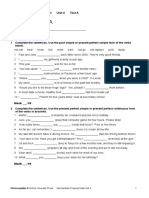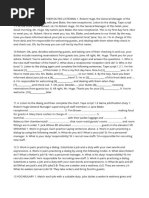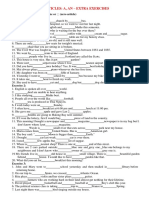MY Test A
MY Test A
Uploaded by
Евгений ВинокуровCopyright:
Available Formats
MY Test A
MY Test A
Uploaded by
Евгений ВинокуровCopyright
Available Formats
Share this document
Did you find this document useful?
Is this content inappropriate?
Copyright:
Available Formats
MY Test A
MY Test A
Uploaded by
Евгений ВинокуровCopyright:
Available Formats
Name __________ Class ____________
TEST A
GRAMMAR AND VOCABULARY NAME ___________________
MID-YEAR
1 Read the text. For gaps 1-7, use the correct form of the word in capitals.
A Shocking Event
1 One of my ______ memories is of the EARLY
nuclear disaster at the Three Mile Island
2 Nuclear Station When it ______ HAPPEN
3 my big brother, Joseph, and I ______ WATCH
television at our grandmother’s house.
4 We ______ eating dinner and we were JUST FINISH
watching an important football match.
Our team had just kicked off when my
5 grandmother ______ into the living RUN
room. She used to have a radio in the
kitchen and she had just heard that a
nuclear accident had occurred in America.
6 We ______ by a journalist reporting on TELL
the situation that the atmosphere near the
Station was very tense. I remember that
7 time like it was yesterday. We ______ FORGET
shocking events like that easily, do we?T
/7
PHOTOCOPIABLE © 2012 Pearson Education Ltd 1
2 Read the text. For gaps I-VII, choose 1, 2, 3 or 4 to complete each gap correctly. Circle the answer
you choose.
My Hero!
The word ‘hero’ means different things to different people. For some, a hero must be a 1__________ who
has done something to change the world, like campaign for 2__________ rights or fight against
discrimination.
My hero is my Uncle Max. He was born 3__________ a poor working class family in 1932.
Unfortunately, however, because his family didn’t have 4__________ money he had to leave school when
he was thirteen.
His first job was in a little restaurant in Manchester. While working there, he 5__________ the washing up
and cleaned the floors—sometimes he worked fourteen hours a day. My uncle 6__________ very well
with the chef at the restaurant and he taught my uncle how to cook.
My Uncle Max is now a well-known chef in a glamorous 7__________ restaurant in London.
I 1 somebody 2 person 3 personality 4 human
II 1 people 2 man 3 human 4 woman
III 1 into 2 inside 3 along 4 onto
IV 1 lot 2 some 3 a bit 4 much
V 1 made 2 got 3 had 4 did
VI 1 got on 2 met up 3 joined in 4 got together
VII 1 fast-food 2 take-away 3 seafood 4 self-service
/8
PHOTOCOPIABLE © 2012 Pearson Education Ltd 2
3 Choose the correct answers.
0 My brother __________ be a punk.
a used to b would c have to d liked
1 The students’ tests __________ at the moment.
a marked b are being marked
c have been marked d are marking
2 The earthquake __________ terrible for the local people.
a can’t be b must be
c can’t have been d must have been
3 I have to __________ my bike repaired before the summer.
a make b ask c get d take
4 We __________ here for three hours and I’m tired.
a have been waiting b had been waiting
c are waiting d wait
5 You were asleep when I phoned, __________ you?
a were b did c weren’t d didn’t
/5
4 Choose the correct words to complete the sentences.
0 I’m not well-off/laid-back/ready-made, but I’m not poor.
1 The castle is one of our most famous landscapes/ lifestyles/landmarks.
2 I’m not keen about/on/of foreign food.
3 Let’s meet up/off/out one day after school.
4 Would you like to pay for/in/on cash or by credit card?
5 We live in a terraced/detached/bungalow house and our nearest neighbours are twenty metres away.
/5
PHOTOCOPIABLE © 2012 Pearson Education Ltd 3
5 Read the text. For gaps 1-6, use the correct form of the word in capitals.
Online Avatars
Online you can create an avatar and make it
1 look __________ like you want it to! What does my avatar look like? Well, EXACT
I’m good-looking
2 but he is really __________! He's got a large round face and a low forehead. He’s got ATTRACT
3 __________ arms and legs but he’s really MUSCLE
4 tall and __________. He has also got black SKIN
5 __________ hair that he doesn’t wash very often. WAVE
Like me, my avatar isn’t very fashion-conscious;
6 he doesn’t care about being __________. When he goes out in his virtual world he STYLE
likes to wear jeans, a T-shirt and his favourite baseball cap.
/5
TOTAL SCORE /30
PHOTOCOPIABLE © 2012 Pearson Education Ltd 4
NAME ______________________________ SKILLS MID YEAR A
Reading
1 Read the article. Are the statements true (T) or false (F)?
1 Not everyone from Wallonia is a Walloon. ______
2 Walloon is spoken only in Belgium. ______
3 Kashubian is the only minority language in Poland. ______
4 Kashubian is similar to Polish. ______
5 The Griko people don’t all live near each other. ______
6 Not many young people speak Griko. ______
/8
Europe is full of minority language speakers. Some, such as the Basques, Catalans, Welsh and Corsicans,
are large groups and well known all over the world. Others are less well known. Here are a few you might
not have heard about.
The Walloons live in the southern half of Belgium in an area called Wallonia. Everyone from Wallonia is a
Walloon. However, they don’t all speak the Walloon language. The majority of the population speak
French. Others speak other minority languages such as Picard or Lorraine. Walloon itself is now almost a
dead language with only 10 percent of the population speaking it as their first language. Most of the
speakers are old people, and when they die, Walloon probably won't exist in Wallonia. However, it is also
the FIrst language in a few villages in northern France and it may survive there.
The area of northern Poland near Gdansk is home to the Kashubians. About 300,000 people call themselves
Kashubian and speak Kashubian. Poland also has another minority language in the south of the country:
Silesian. Some words in Kashubian and Silesian are the same in Polish and Poles can understand both
languages. So are Kashubian and Silesian actually different languages or a form of Polish? Different people
have different opinions, but the Kashubians and Silesians agree that they have got their own language and
that this language is definitely not Polish. A much smaller group of people are the Grikos of Italy. There are
about 40,000 Grikos in total and they live in two different parts of southern Italy. One group live in the far
south-west, near the island of Sicily, while the other group live in the far south-east, on the Adriatic coast.
Their roots are in the Greek communities who lived in the area thousands of years ago. About 20,000 of
these people speak Griko as their first language. Unfortunately, most of them are older people; the younger
generation want to speak Italian. However, even the Italian speakers are proud of their Griko roots, and the
Griko people celebrate their culture every year with a night of singing and dancing in the town of
Melpignano.
PHOTOCOPIABLE © 2012 Pearson Education Ltd 5
Listening
2 14 Listen to six people and choose the correct answers.
1 The meal:
a is difficult to make. b is unhealthy.
c isn’t very tasty.
2 The girl:
a has moved to a different home.
b has had something done to her room.
c has been living somewhere else for a while.
3 The boy:
a has changed from one urban tribe to another.
b has joined an urban tribe for the first time.
c has stopped being in an urban tribe.
4 The event:
a is celebrated every year.
b is being celebrated for the first time.
c has been celebrated once before.
5 Constance Lytton:
a did something illegal. b saved someone’s life.
c stopped a crime.
6 The girl wasn’t disappointed by the boy’s:
a face. b body. c clothes.
/6
PHOTOCOPIABLE © 2012 Pearson Education Ltd 6
Communication
3 Complete the dialogue with one word in each gap. The first letter of each word has been given.
Boy: Here we are. This is the restaurant I was telling you about.
Girl: It 0looks very nice. 1L___________ sit down and look at the menu. What’s calamari?
Boy: It’s a 2k___________ of seafood, I 3t___________ .
Girl: I love seafood.
Boy: Me 4t___________ .
Girl: 5
S___________ we have some?
Boy: Okay. Here's the waiter. Excuse me, we’re 6r___________ to order. We’ll both have calamari,
please.
Waiter: I’m sorry, but I’m 7a___________ we’re out of seafood.
Boy: Oh dear.
Girl: 8
N___________ mind. Let’s have chicken instead.
/8
TOTAL SCORE /20
PHOTOCOPIABLE © 2012 Pearson Education Ltd 7
You might also like
- Gold Pre-First Progress Test 2: Name - ClassNo ratings yetGold Pre-First Progress Test 2: Name - Class5 pages
- Focus3 2E Review Test 4 Units1 8 Vocabulary Grammar UoE Reading GroupBNo ratings yetFocus3 2E Review Test 4 Units1 8 Vocabulary Grammar UoE Reading GroupB3 pages
- Focus4 2E Unit Test Vocabulary Grammar UoE Unit6 GroupANo ratings yetFocus4 2E Unit Test Vocabulary Grammar UoE Unit6 GroupA3 pages
- Focus5 2E Vocabulary Quiz Unit1.1 GroupB 2kolNo ratings yetFocus5 2E Vocabulary Quiz Unit1.1 GroupB 2kol2 pages
- HighNote4 Cumulative Test Units01 04 GroupANo ratings yetHighNote4 Cumulative Test Units01 04 GroupA3 pages
- Hurry On and You'll Soon Get Better at The Job. HurtNo ratings yetHurry On and You'll Soon Get Better at The Job. Hurt4 pages
- Focus3 2E Cumulative Test 3 Units1-6 GroupBNo ratings yetFocus3 2E Cumulative Test 3 Units1-6 GroupB4 pages
- Gold Pre-First Progress Test 1: Name - ClassNo ratings yetGold Pre-First Progress Test 1: Name - Class5 pages
- Track: Cheerful / Hard-Working / Smart. Casualty Ward at The Nearest HospitalNo ratings yetTrack: Cheerful / Hard-Working / Smart. Casualty Ward at The Nearest Hospital3 pages
- Bài Tập Anh 11 Friend Global Lưu Hoàng Trí Unit 1 - GenerationsNo ratings yetBài Tập Anh 11 Friend Global Lưu Hoàng Trí Unit 1 - Generations36 pages
- Контрольна робота з Англійської мови за 1 семестрNo ratings yetКонтрольна робота з Англійської мови за 1 семестр3 pages
- 2 Match The Phrases (1-8) To The Definitions (A-H)No ratings yet2 Match The Phrases (1-8) To The Definitions (A-H)3 pages
- Focus2 2E Review Test 1 Units1 2 Vocabulary Grammar UoE ReadingNo ratings yetFocus2 2E Review Test 1 Units1 2 Vocabulary Grammar UoE Reading3 pages
- Gold First Units 1-3 Progress Test 1: Name - Class100% (1)Gold First Units 1-3 Progress Test 1: Name - Class5 pages
- The Don't Laugh Challenge Dad vs. Kid Edition: The Ultimate Showdown Between Dads and Kids - A Joke Book for Father's Day, Birthdays, Christmas, and MoreFrom EverandThe Don't Laugh Challenge Dad vs. Kid Edition: The Ultimate Showdown Between Dads and Kids - A Joke Book for Father's Day, Birthdays, Christmas, and MoreNo ratings yet
- The Classical Brigade: Kitchen OrganizationNo ratings yetThe Classical Brigade: Kitchen Organization1 page
- Jumeirah Hotels Resorts MICE Directory 2016No ratings yetJumeirah Hotels Resorts MICE Directory 201680 pages
- Unit 1 Hotel Staff and Their Duties Listening 1No ratings yetUnit 1 Hotel Staff and Their Duties Listening 14 pages
- Produced by An Autodesk Educational Product: Proposed First Floor PlanNo ratings yetProduced by An Autodesk Educational Product: Proposed First Floor Plan1 page
- The Italian Village Chicken Vesuvio Recipe Recipe - Food NetworkNo ratings yetThe Italian Village Chicken Vesuvio Recipe Recipe - Food Network1 page
- Practical English Dialogues Conversation Topics Dialogs - 43616100% (1)Practical English Dialogues Conversation Topics Dialogs - 436165 pages
- مواضيع تعبير الصف السادس مواصفات حديثة 2019No ratings yetمواضيع تعبير الصف السادس مواصفات حديثة 20193 pages
- An Adjective Describes A Noun or A PronounNo ratings yetAn Adjective Describes A Noun or A Pronoun6 pages
- Hachinan Tte Sore Wa Nai Deshou! Volume 11No ratings yetHachinan Tte Sore Wa Nai Deshou! Volume 11325 pages
- Articles: A, An - Extra Exercises: Fill in The Blanks With A, An, The or (Zero Article) Exercise 1No ratings yetArticles: A, An - Extra Exercises: Fill in The Blanks With A, An, The or (Zero Article) Exercise 13 pages
- Focus3 2E Review Test 4 Units1 8 Vocabulary Grammar UoE Reading GroupBFocus3 2E Review Test 4 Units1 8 Vocabulary Grammar UoE Reading GroupB
- Focus4 2E Unit Test Vocabulary Grammar UoE Unit6 GroupAFocus4 2E Unit Test Vocabulary Grammar UoE Unit6 GroupA
- Hurry On and You'll Soon Get Better at The Job. HurtHurry On and You'll Soon Get Better at The Job. Hurt
- Track: Cheerful / Hard-Working / Smart. Casualty Ward at The Nearest HospitalTrack: Cheerful / Hard-Working / Smart. Casualty Ward at The Nearest Hospital
- Bài Tập Anh 11 Friend Global Lưu Hoàng Trí Unit 1 - GenerationsBài Tập Anh 11 Friend Global Lưu Hoàng Trí Unit 1 - Generations
- 2 Match The Phrases (1-8) To The Definitions (A-H)2 Match The Phrases (1-8) To The Definitions (A-H)
- Focus2 2E Review Test 1 Units1 2 Vocabulary Grammar UoE ReadingFocus2 2E Review Test 1 Units1 2 Vocabulary Grammar UoE Reading
- Gold First Units 1-3 Progress Test 1: Name - ClassGold First Units 1-3 Progress Test 1: Name - Class
- The Don't Laugh Challenge Dad vs. Kid Edition: The Ultimate Showdown Between Dads and Kids - A Joke Book for Father's Day, Birthdays, Christmas, and MoreFrom EverandThe Don't Laugh Challenge Dad vs. Kid Edition: The Ultimate Showdown Between Dads and Kids - A Joke Book for Father's Day, Birthdays, Christmas, and More
- Produced by An Autodesk Educational Product: Proposed First Floor PlanProduced by An Autodesk Educational Product: Proposed First Floor Plan
- The Italian Village Chicken Vesuvio Recipe Recipe - Food NetworkThe Italian Village Chicken Vesuvio Recipe Recipe - Food Network
- Practical English Dialogues Conversation Topics Dialogs - 43616Practical English Dialogues Conversation Topics Dialogs - 43616
- Articles: A, An - Extra Exercises: Fill in The Blanks With A, An, The or (Zero Article) Exercise 1Articles: A, An - Extra Exercises: Fill in The Blanks With A, An, The or (Zero Article) Exercise 1

























































































